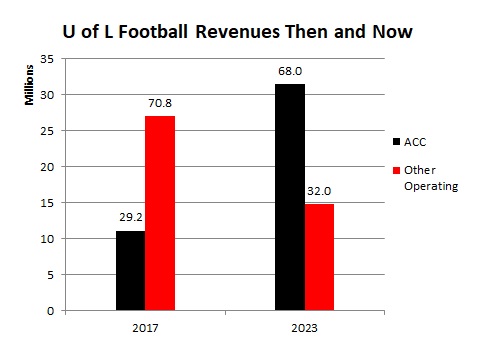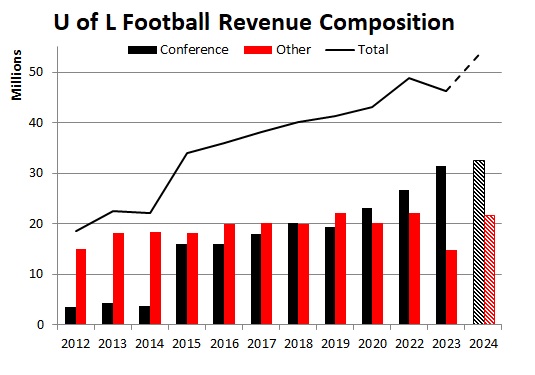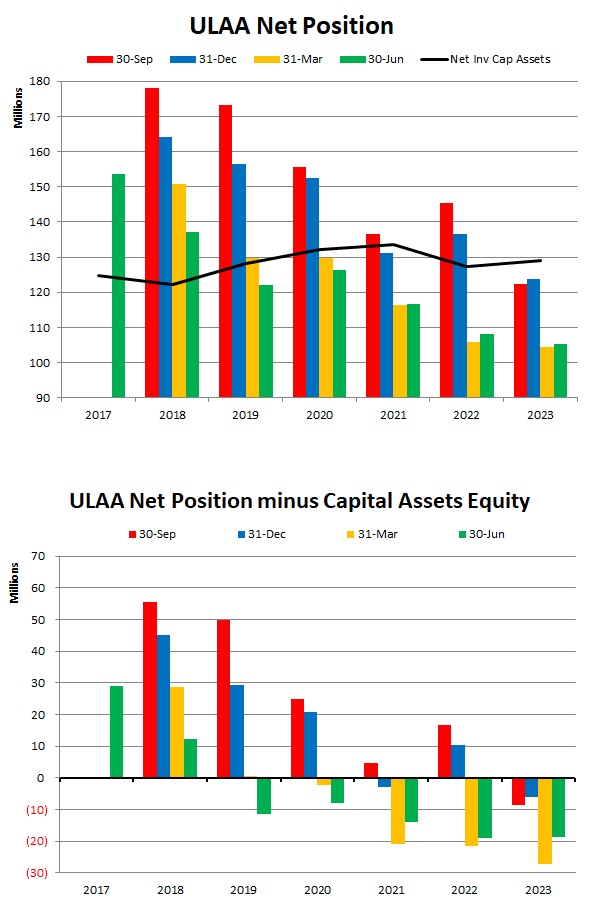The latest ULAA financials provide an update on a significant shift in the source of football revenues. This trend didn’t just start. But after six years of moving in opposite directions, revenues from the ACC specifically and revenues from other sources have pretty much reversed their importance to the athletic department.
When the current regime took over in 2017, football revenues from the conference represented just under 30% of football operating revenues overall. For the fiscal year just completed, ACC revenues now comprise almost 70% of the money that football produces. Correspondingly, revenues from other sources in football have declined from 70% of the total in 2017 to 30% in 2023. Never has U of L football and athletics overall been more reliant on the conference for its financial survival.
 Between those years, ACC revenues (black bars) increased by 184%—unadjusted for inflation—from $11.1 million to $31.5 million. However, that’s not the complete story because non-ACC revenues (red bars) declined 45% from $27.0 million to $14.8 million, then and now. That last number is the lowest football revenue derived outside the conference since at least 2012 when I started compiling these stats. (Total football revenue in 2012 was $18.6 million, with conference revenues accounting for a miniscule $0.5 million.)
Between those years, ACC revenues (black bars) increased by 184%—unadjusted for inflation—from $11.1 million to $31.5 million. However, that’s not the complete story because non-ACC revenues (red bars) declined 45% from $27.0 million to $14.8 million, then and now. That last number is the lowest football revenue derived outside the conference since at least 2012 when I started compiling these stats. (Total football revenue in 2012 was $18.6 million, with conference revenues accounting for a miniscule $0.5 million.)
Again, bear in mind these dollar amounts aren’t inflation adjusted. CPI measured inflation was north of 20% between 2017 and 2023. A 45% nominal decline is at least ten percent understated in real, inflation adjusted terms.
Even with Jeff Brohm at the helm, U of L won’t fill that large of a financial hole in football operations anytime soon. Hell, Nick Saban couldn’t get that job done. Just remember to check the numbers when we get off to a good start this season and some—esp. U of L—start beating the band about the state of the program. Thanks to them, we’ve got a long way to go…
When the current regime took over in 2017, football revenues from the conference represented just under 30% of football operating revenues overall. For the fiscal year just completed, ACC revenues now comprise almost 70% of the money that football produces. Correspondingly, revenues from other sources in football have declined from 70% of the total in 2017 to 30% in 2023. Never has U of L football and athletics overall been more reliant on the conference for its financial survival.

Again, bear in mind these dollar amounts aren’t inflation adjusted. CPI measured inflation was north of 20% between 2017 and 2023. A 45% nominal decline is at least ten percent understated in real, inflation adjusted terms.
Even with Jeff Brohm at the helm, U of L won’t fill that large of a financial hole in football operations anytime soon. Hell, Nick Saban couldn’t get that job done. Just remember to check the numbers when we get off to a good start this season and some—esp. U of L—start beating the band about the state of the program. Thanks to them, we’ve got a long way to go…



